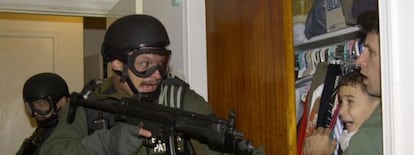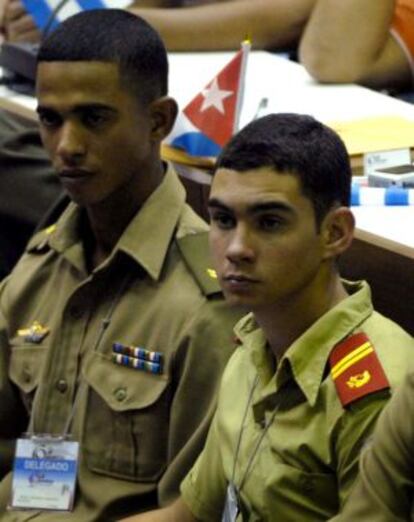Fidel Castro's boy hero
Elián González made the headlines when he was plucked from the sea in 1999 The youngster became a symbol of the enmity between Havana and Cuban exiles Now aged 18, he represents the Revolution

Taken in the early hours of April 22, 2000 in Miami, the photo made the front pages of newspapers around the world: heavily armed US immigration officers wielding rifles storm into a tiny bedroom where a man, backed up against an open wardrobe, clutches a terrified small boy in his arms.
The Pulitzer Prize-winning image captured the final moments of an extraordinary story that had begun six months earlier, when Elizabeth Brotons fled her native Cuba with her six-year-old son Elián. They were headed to Miami, aboard a rickety aluminum boat. Hit by a storm that quickly sank the vessel, Brotons was able to place her son in an inflated inner tube before she drowned. Two days later, on Thanksgiving, fishermen found Elián drifting in the shark-infested waters off the Florida coast, protected by a pod of dolphins. Miraculously, the boy had survived.
He was handed over to his paternal grandfather, Lázaro González, who lived in Miami. But Elián's father, Juan Miguel, still in Cuba, immediately filed for custody of his son, who had been taken without his permission. The case soon became an international cause célèbre. Fidel Castro tried to turn the affair into a symbol of his regime's fight against Yankee imperialism, organizing marches demanding Elián's return. Meanwhile, in Miami, hundreds of members of the Cuban exile community staged a vigil outside González's house. President Bill Clinton - aware that under international law, Elián's father's request for custody would be granted - was keen to avoid an international incident, and made clear that the government supported the boy's repatriation. Nevertheless, the anti-Castro lobby was able to stall his return, taking the case to court. US judges ruled in favor of Elián's father, and sent in immigration officers to "rescue" him after family members refused to give him up. Two months later, on June 28, Elián arrived in Havana, and was paraded before the media as "the pride" of Cuba.
Journalist Iván García says Elián has been living in a "bubble"
Twelve years later, now aged 18, Elián is a cadet at the elite Camilo Cienfuegos Military School, and a leading figure in the Union of Communist Youth: Fidel Castro presented him with his membership card on the occasion of his 14th birthday.
According to Cuban journalist Iván García, Elián has been living in a "bubble" since his return. His father no longer works as a waiter, now occupying a seat in the Cuban parliament, and the family lives in a large, comfortable house guarded by security agents. Any contact with Elián has to be arranged through the authorities.
Since his return, Elián has taken on a high-profile role embodying the values of the Cuban Revolution. After joining the Communist Party's youth wing, Elián enrolled at military school. "A decade after the enemies of the Revolution used him as their plaything," wrote the party's youth newspaper, "we see him dressed in olive green, preparing to become an officer in the Revolutionary Armed Forces." And in December, after turning 18, Elián took part in a march demanding the return of five Cubans jailed for spying in the United States.

To judge by the tenor of Elián's comments to the Cuban media, it would seem that the Castro brothers' fears that Elián had been brainwashed by the Miami exiles and the US authorities were unfounded: "I am proud to be able to make a contribution to the Revolution;" "The role of our youth is to be in the revolutionary vanguard;" "Fidel Castro is the greatest figure in Cuban history..."
The extent to which Elián, who describes himself publicly as "just another young person of the Revolution," can convince his contemporaries that the Cuban regime is worth defending is arguable. But that brief incident has cast a long shadow over Cuban life: during his six-month stay in Miami, the authorities set up the Anti-Imperialist Court in front of the office representing US interests in Cuba, from where innumerable marches and rallies were staged. One resident who lives close by describes those months as "hell." The other lasting legacy of Elián's US odyssey is Round Table, used by the regime to explain its latest initiatives and activities on behalf of Cubans.
Cárdenas, Elián's home town, has been turned into something of a shrine to the boy hero. The fire station is now a museum dedicated to the so-called Battle of Ideas, launched during the time that Elián was in Miami. It is an attempt to reengage Cubans with the ideals of the revolution, especially young Cubans who came of age during the Special Period - a time of greater economic and civil openness in the 1990s. A statue of the boy hero, clenched fist raised, now stands outside.
Fidel Castro is the greatest figure in Cuban history," the young cadet has said
Across the water in Miami, the tiny bedroom where Elián stayed for six months in 2000 has been turned into a shrine, left as it was 12 years ago, along with the inflatable tire tube that saved the boy's life.
Delfín González, Elián's great uncle, looks after the house since his brother Lázaro left, unable to stand the media exposure the case attracted. Donato Dalrymple, the fisherman who plucked the boy from the sea - and who was immortalized in the photo of US immigration agents storming Elián's bedroom - has found returning to normal life hard after being in the limelight. Dalrymple insists that he had a "special" role to play in Elián's life, calling himself the boy's "savior."
Since returning to Cuba, Elián's relatives in the United States say that they have been unable to contact the boy directly, but that his family in Cárdenas keeps them abreast of events in his life. They still insist that Elián would have preferred to stay in the US, but that they do not hold a grudge against the Cuban branch of the family, instead blaming Castro.
Asked in one of the innumerable interviews published in the Cuban media since his return what his life would have been like had he stayed in the United States, Elián's reply is textbook Cuban Communist Party: "As the aim of the empire is to monopolize the world, to develop industry and to obtain capital, perhaps I would have been wealthy. Or maybe not. I could have been manipulated like a toy... Who knows what the empire would be prepared to do to. They would have manipulated me for their political ends."
Tu suscripción se está usando en otro dispositivo
¿Quieres añadir otro usuario a tu suscripción?
Si continúas leyendo en este dispositivo, no se podrá leer en el otro.
FlechaTu suscripción se está usando en otro dispositivo y solo puedes acceder a EL PAÍS desde un dispositivo a la vez.
Si quieres compartir tu cuenta, cambia tu suscripción a la modalidad Premium, así podrás añadir otro usuario. Cada uno accederá con su propia cuenta de email, lo que os permitirá personalizar vuestra experiencia en EL PAÍS.
¿Tienes una suscripción de empresa? Accede aquí para contratar más cuentas.
En el caso de no saber quién está usando tu cuenta, te recomendamos cambiar tu contraseña aquí.
Si decides continuar compartiendo tu cuenta, este mensaje se mostrará en tu dispositivo y en el de la otra persona que está usando tu cuenta de forma indefinida, afectando a tu experiencia de lectura. Puedes consultar aquí los términos y condiciones de la suscripción digital.








































